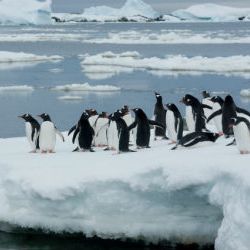Scientists Can Now Track Penguin Huddles In Real Time

On Antarctica’s harsh frozen landscape, emperor penguins huddle together to defend themselves from the cold and windy weather. The huddling allows the penguins to pool their warmth and conserve energy during periods between forages and breeding. This behaviour has been documented for a long time but now scientists have the technology to observe the evolution of a penguin huddle. The study revealed the main trigger prompting penguins to huddle and reaffirmed the purpose of the behaviour.
Remote sensing has changed the game
Because huddles are located great distances away from permanent research stations in icy and windy conditions, it is extremely challenging to obtain information one of the researchers says. Now because there are remote sensing observatories that have instruments linked to the internet it is possible for researchers to go online any time they want and see exactly what is happening in the emperor penguin colony.
Huddling for Warmth
In May 2014 remote sensors observed the shape and total areas of huddles and then estimated the number of individual penguins within each huddle. Other instruments were simultaneously used to record the wind speed, ambient temperature, solar radiation and relative humidity. By using that data and comparing it with the penguins huddling behaviour, researchers found that penguins were much more likely to huddle when it gets extremely cold, when the phase transition temperature drops to −48.2°C.
Penguins as proxies
The transition temperature is basically a combination of four weather parameters into a single metric that is measured in degrees. This is able to serve as a proxy for the success penguins can expect when foraging for food. This means that if the temperature warms and for some reasons the penguins huddle in response, it suggests the penguins have less energy to keep themselves warm. The findings are consistent with the thesis that penguins huddle for warmth rather than protection from predators.
Tracking climate change
Continuous data has been available since 2013 and researchers point out that the huddling behaviour of penguin’s tracks changes to the Antarctic biome in response to global warming. The researchers say it is important to know which colonies are going to be the worst affected by climate change because it allows conservation efforts to be targeted and measures like marine protected areas to be established to help keep them protected.



